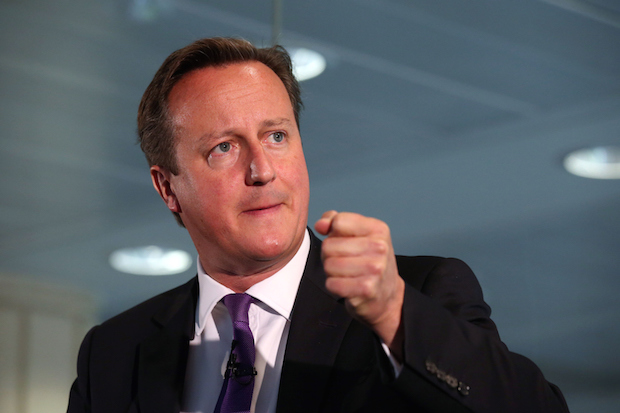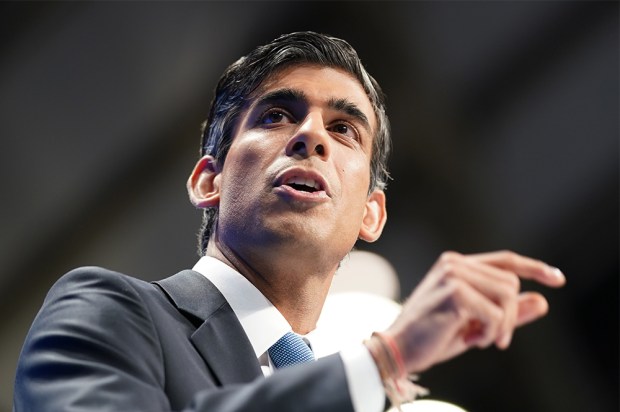When launching the Conservatives’ campaign this week, David Cameron told party activists that the general election was ‘on a knife edge’. He is right. His chances are little better than 50/50, which is terrifying given the calibre of his opponent. The Prime Minister is entering this election with a list of achievements matched by almost no other leader in Europe. Yet he’s struggling to beat one of the least popular opposition leaders in modern times. What has gone wrong?
It’s not the economy. Employment stands at a record high, and most voters will never have lived through such low inflation as we have today. The price of food is actually falling, as is the price of petrol; it costs £18 less to fill up an average car than it did 18 months ago. Mortgage rates stand at record lows, too — the average five-year fix is a snip at 3.1 per cent. Real wages are finally creeping up, household disposable income is at a six-year high, and the recovery gathers strength all the time. From the factory gate to the high street, confidence has returned.
To lose an election in such circumstances takes quite some doing. The absence of a Tory lead is all the more remarkable given that the polls show the Prime Minister ahead on the issues of economic competence and overall leadership ability. No one has ever lost power while leading on these two issues. But almost no one is being asked to vote for David Cameron: the choice we face on 7 May is to vote for MPs of a certain party. The problem lies with the popularity of the Conservative party, whose motives are still not entirely trusted.
When Cameron arrived in No. 10, the Tories gained a Prime Minister but lost a salesman and advocate. He has not talked much about the Conservatives, and occasionally behaves as if the party is an embarrassment. Conservative membership has almost halved under his leadership, a fairly clear sign that the party was being hollowed out. Yet this was explained by his aides as a sign of the times; that people simply don’t join political parties nowadays. This is untrue, as the SNP and Ukip have proved.
Cameron would never admit it, but he has turned out to be a rather good Conservative. He has liberalised schools: there are 4,300 more Academies and 225 new free schools offering places for over 100,000 pupils (and three applications for every place). He asked Iain Duncan Smith to enact radical and much-needed welfare reform. He has modernised the health service, cutting 18,000 bureaucrats and hiring 8,700 more doctors — last week it emerged that public satisfaction with the NHS now stands at a record high. Cameron does not just have a good track record, but a remarkable one, especially given the financial constraints under which he has operated.
To what can his success be attributed? ‘I hope people see that I am a reasonable person,’ he said in a recent interview. ‘I think reasonableness is very underrated in politics.’ As he is finding out, Conservatism is also underrated. It is Conservative values which have brought about a jobs miracle, empowered teachers, revived failing hospitals and created an economy whose employment rate is envied across the Continent.
It’s also worth recording — because the Prime Minister can be relied upon not to mention it during the campaign — that the Conservatives’ university tuition fee system has also worked. It was a progressive reform: fees of up to £9,000 are being charged and repaid through a graduate tax. But a chunk of this money is set aside to help universities encourage less well-off students in whatever way they think best. As a result, England has now seen record university applications, even from poorer students. This achievement should be treated as a proud boast, not a dirty secret.
Elections are at their most exciting when they are a battle of ideas, yet too much of the Tory campaign has involved blowing poison darts at the Labour party, or tiptoeing around the views of focus groups. Paradoxically, the politicians who obsess most about elections are always the worst at actually winning them. Left or right, the great political victories tend to come from those who can articulate a clear agenda and have the courage to pursue it; who don’t just parade their achievements but explain them.
It’s not too late for David Cameron to try. As James Forsyth revealed in these pages six weeks ago, he is considering a plan to let 2.5 million housing association tenants buy their homes at a steeply discounted price. This would not only give 2.5 million people a good reason to vote Tory, but serve as a simple ad for Conservative principles: a belief in passing power from the state to the people. Mr Cameron has indicated that he could make this proposal the centrepiece of the Tory manifesto, which would electrify what may otherwise be a dull, defensive campaign.
Four years ago, an artwork by Tracey Emin was installed inside the Camerons’ Downing Street flat. It consists of two words in neon: ‘more passion’. With five weeks left until polling day, that is precisely what’s needed.
Got something to add? Join the discussion and comment below.
Get 10 issues for just $10
Subscribe to The Spectator Australia today for the next 10 magazine issues, plus full online access, for just $10.
You might disagree with half of it, but you’ll enjoy reading all of it. Try your first month for free, then just $2 a week for the remainder of your first year.














Comments
Don't miss out
Join the conversation with other Spectator Australia readers. Subscribe to leave a comment.
SUBSCRIBEAlready a subscriber? Log in